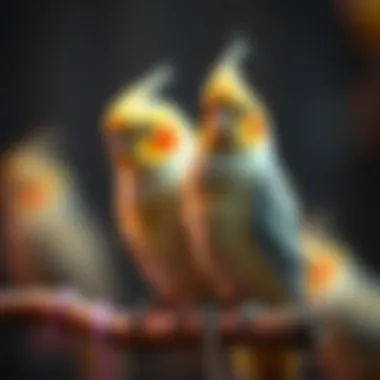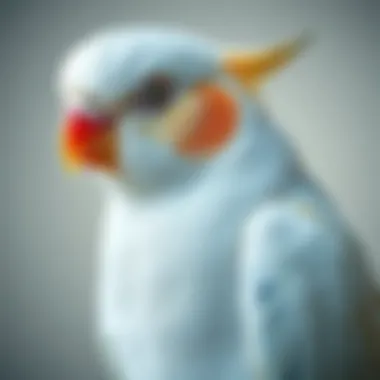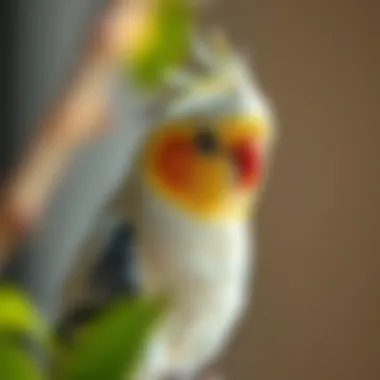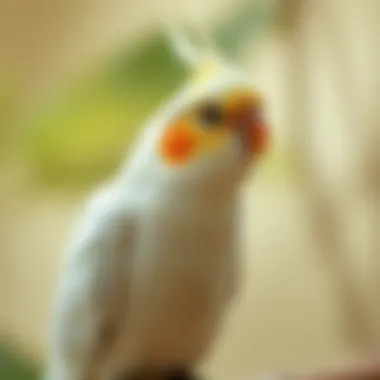Essential Diet for Cockatiels: Your Complete Guide


Intro
Understanding what to feed your cockatiel might seem straightforward at first, but dig a little deeper, and the nuances reveal themselves. Cockatiels have unique dietary needs that are crucial for their health, vitality, and overall well-being. Many pet owners underestimate the importance of diet, often feeding their birds only seed mixes or commercial pellet brands, but that's just scratching the surface. It’s imperative to offer a balanced diet that replicates what they might find in their natural habitat.
In this guide, we’ll discuss essential aspects of cockatiel nutrition, feeding methodologies, and the best food options available. You’ll learn how to ensure your feathered friend thrives through informed dietary choices. By providing a comprehensive look that covers everything from basic your pet behavior to more intricate nutritional considerations, this article aims to equip you with the knowledge necessary to keep your cockatiel happy and healthy. Let’s take this journey into the multifaceted world of cockatiel care, starting with a closer look at understanding your pet.
Understanding Cockatiel Nutrition
As guardians of cockatiels, understanding their nutritional needs is paramount. A well-balanced diet forms the bedrock for a healthy and vibrant bird. Cockatiels, like all pet birds, have unique dietary requirements that directly influence their well-being. When pet owners grasp the essentials, they can ensure their feathered companions live long and fulfilling lives.
The Importance of a Balanced Diet
A balanced diet is not just a good idea; it is essential for cockatiels. It plays a crucial role in preventing a host of health issues, from feather plucking to obesity. Giving your cockatiel a variety of foods, from seeds to fruits, meets their natural dietary needs. Each category of nutrients they consume influences everything from energy levels to feather health.
Feeding them well is akin to providing a solid foundation for a house. Without that base, everything else stands on shaky ground, and similarly, an unbalanced diet exposes cockatiels to stress and illnesses. When you focus on a balanced diet, you pave the way for a happy, boisterous bird that flourishes in your care.
Nutritional Requirements
To truly fulfill a cockatiel's needs, one must delve into the individual components that make up a nutritious diet. The four pillars are proteins, fats, carbohydrates, and vitamins and minerals, each serving a specific purpose in the grand machinery of avian health.
Proteins
Proteins are often termed the building blocks of life, and for good reason. They are essential for growth, healing, and the maintenance of cellular function. Cockatiels require a good dose of protein daily to support muscle development and other bodily functions. A common source of protein for cockatiels includes legumes, eggs, and certain seeds such as hemp and pumpkin. They help in feather growth, which is crucial during molting seasons.
What makes proteins particularly beneficial is their varied source options. Different bird owners can incorporate a mix according to their birds' preferences. However, it’s crucial to avoid over-reliance on high-fat sources, which can lead to obesity.
Fats
Fats, in moderation, are equally important. They provide the necessary energy that keeps cockatiels active throughout the day. Unsaturated fats, particularly from sources like nuts and seeds, contribute positively to a cockatiel's overall health. Fatty acids play an essential role in feather health, maintaining luster and vitality.
Nevertheless, not all fats are created equal. Keep an eye on the amount, as an excess can lead to dire consequences—weight issues and even liver problems. Striking the right balance here ensures that they receive the energy without the risk of health concerns.
Carbohydrates
Carbohydrates are the powerhouse of cockatiel diets. Found in abundance in grains and some fruits, they provide a quick energy boost. Whole grains, specifically, are a preferred choice as they also offer fiber that aids in digestion. Offering options like cooked quinoa or plain pasta can be a delightful surprise for your cockatiel while adding much-needed nutrients.
While carbohydrates are beneficial, portion sizes should be monitored. A diet too rich in carbs can create lethargy and health issues, leading to obesity. Thus, a balanced incorporation of this nutrient is key.
Vitamins and Minerals
Vitamins and minerals are clutch when considering a cockatiel's overall health. They play roles in immune function, bone health, and even feather quality. Essential vitamins like A, D, and E, alongside minerals like calcium and phosphorus, form a very significant part of their diet. Fresh greens and fortified pellets can help meet these needs effectively.
What stands out about vitamins and minerals is how they work synergistically. For example, calcium is crucial for bone strength, but it also works well alongside Vitamin D to ensure proper absorption. It's essential to ensure your cockatiel's diet contains a colorful mix of fruits and vegetables to cover these bases.
Applying this understanding of nutritional needs not only elevates your bird's health but also enhances the overall interactive experience.
Remember, a happy cockatiel is one that's well-fed and well-nourished. With the right diet, you're bound to witness vibrant feathers, chirpy attitudes, and a more energetic companion!
Types of Food for Cockatiels
Feeding your cockatiel a varied and balanced diet is crucial for their health and well-being. The right mix of foods can promote good health, vibrant plumage, and overall happiness in these charming birds. When selecting food for them, it’s essential to understand the different types available and how they contribute to a cockatiel's dietary needs.
Seed Diets


Seeds have long been the go-to food for many birds, including cockatiels. They naturally enjoy a variety of seeds, such as millet, sunflower seeds, and safflower seeds. While seeds can be tasty, they often lack the complete nutrition that cockatiels need. Seed diets can lead to nutritional deficiencies if they are not complemented with other food types. It's like trying to run a race on just one shoe; it might get you somewhere, but you're not going to get very far.
Moreover, seeds are high in fat, which can contribute to obesity if served in excess. Many pet owners fall into the trap of treating seeds as a primary food source. Thus, they need to be offered as part of a diverse diet rather than the main event.
Pellets: A Complete Diet Option
Pellets are designed to provide all the nutrients cockatiels require, packed into small, manageable bites. The idea is simple: it gives birds a balanced meal without leaving out essential vitamins and minerals. Unlike seeds, pellets are formulated to ensure that each bite contributes to a cockatiel's overall dietary needs. As such, they are often considered a more complete option than seed mixtures.
However, getting your cockatiel accustomed to pellets may take some time, as many are resistant at first. Mixing pellets with a variety of seeds or fresh foods can ease this transition. Eventually, this can lead to better health outcomes in the long run. It’s a solid choice to consider incorporating pellets into your bird's diet early on.
Fresh Fruits and Vegetables
Fresh produce brings a wealth of vitamins and hydration to a cockatiel's diet. Fruits and vegetables are crucial for promoting good health, adding essential nutrients that may be missing from seed or pellet-based diets.
Fruits: Best Options
When it comes to fruits, some favorites include apples, bananas, and berries. Each of these options offers different vitamins. For instance, apples provide hydration, while bananas contribute potassium. What sets these fruits apart is their natural sweetness, which can be enticing to your cockatiel. Including these fruits can make their meals more enjoyable and varied.
Moreover, fresh fruits can stimulate a cockatiel’s intellect because they often have to peck and nibble to access the sweet treats inside. However, portion size is key, as too much sugar from fruits can also lead to health issues.
Vegetables: Safe Choices
Vegetables provide hearty nutrition and should not be overlooked. Leafy greens such as kale, spinach, and romaine lettuce are excellent additions. These leafy options contain necessary vitamins like A and K, which are vital for a cockatiel’s recovery and well-being.
What distinguishes vegetables is their ability to provide fiber, supporting the digestive system. Many bird owners find that introducing vegetables can be a bit of a hard sell. Cockatiels can be finicky eaters, often preferring the taste of sweeter fruits. To ease them into eating veggies, try mixing them with their preferred fruits or pellets at first. Ultimately, incorporating a range of vegetables ensures that their diet is well-rounded, helping them thrive.
Grains and Cooked Foods
Grains, along with cooked foods, can round out a cockatiel's diet and offer a different texture and taste experience. Cooked whole grains like quinoa or brown rice can deliver both energy and essential nutrients. However, make sure to avoid any grains that are seasoned or flavored, as those can contain harmful additives. Simple is better for our feathered friends.
In summary, the types of food offered to your cockatiel greatly impact its health and happiness. A balanced diet, incorporating seeds, pellets, fresh fruits, vegetables, and grains, provides a blend of tastes and nutrients that can contribute positively to their lives.
Feeding Best Practices
Ensuring the health and happiness of your cockatiel starts with a solid routine when it comes to feeding. Just like people, cockatiels thrive on consistency and balance in their diets. Adhering to proper feeding best practices isn't merely an option—it's a necessity. These practices not only guarantee that your feathered friend receives essential nutrients but also help in establishing a trustworthy environment where your cockatiel feels safe and secure while eating. This section will explore key elements, benefits, and practical considerations that any pet owner should keep in mind.
Establishing a Feeding Schedule
Setting up a feeding schedule is a vital element in your cockatiel's daily routine. Birds are creatures of habit, and a regular feeding time helps to create a sense of stability in their environment. An effective approach is to provide meals at the same time every day, allowing your cockatiel to anticipate food. For cockatiels, feeding twice a day—once in the morning and once in the evening—tends to work best.
Consideration must also be given to the amount of food offered at each serving. A cockatiel’s feeding schedule can be seen as a combination of feeding times and portion sizes, both of which must be thought out carefully. As a rule of thumb, remove any uneaten or stale food within a couple of hours to maintain freshness and ensure that your cockatiel is getting the nutrition it needs. Regular feeding routines can also help monitor any behavioral changes.
Portion Control: Avoiding Overfeeding
Just because your cockatiel might beg for food doesn’t mean it needs as much as it asks for. Overfeeding can lead to various health issues, including obesity, which can severely impact their lifespan. To avoid this pitfall, it is essential to determine the right portions based on your cockatiel’s size, age, and activity level. A good starting point is to provide 1-2 tablespoons of pellets or seeds per feeding, adjusting based on your bird’s specific needs.
A worthwhile practice is to observe your cockatiel at mealtime. If it’s constantly leaving food behind, consider reducing portion sizes. Alternatively, if it finishes too quickly, perhaps it’s time to up the ante a little. Generally, watching the behavior at feeding times can offer a wealth of insight into their actual needs.
"Healthy feeding practices not only contribute to well-being, but they also enhance the emotional bond between owner and pet."
Monitoring Food Freshness
Cockatiels can be picky eaters, so food freshness is paramount. Stale or rotten food can lead to health complications that are easily avoidable. Freshness goes beyond just the smell—consider the expiry dates of pellets and check for mold or spoilage in fruits and vegetables. Remove perishable items after a few hours, as warm temperatures can accelerate spoilage.


For optimum freshness, store your cockatiel’s food in a cool, dry place, and ensure airtight containers for opened bags of seed or pellets. For those who are nurturing their culinary skills, making fresh food available can add a new twist to their cockatiel’s diet—just take care to monitor how much is eaten during mealtimes, ensuring all food is consumed or discarded appropriately.
In summary, implementing solid feeding practices presents numerous benefits and contributes to a longer, healthier life for your cockatiel. Establishing a careful schedule, practicing portion control, and maintaining the freshness of available food will not only nourish your pet physically but also strengthen the bond you share with it.
Common Dietary Mistakes to Avoid
Feeding cockatiels might seem simple, but even the most seasoned bird owners can trip over a few common pitfalls. Understanding these missteps is crucial for the health of your feathered friend. Just like you wouldn’t want to eat fast food every day, cockatiels also need a well-rounded diet. With the right knowledge, you can steer clear of these errors and promote a longer, healthier life for your cockatiel.
Excessive Seed Diets
One of the biggest misconceptions among cockatiel owners is the idea that seeds should make up the bulk of a cockatiel’s diet. While seeds can provide some nutrients, they are often high in fats, leading to obesity and various health complications. If your cockatiel munches on seeds like there's no tomorrow, you might want to reconsider this approach. Switching to a pellet-based diet as the primary food source can help balance their intake.
It's essential to limit seed portion sizes to ensure a more diverse diet and counteract the high-caloric content of seeds.
Instead of solely relying on seeds, mix them with healthy alternatives like fruits, vegetables, and grains. A variety in their meals can substantially enhance their overall well-being and keep them active and playful.
Neglecting Fresh Food
Just tossing a few seed mixes into the cage doesn’t cut it. Fresh fruits and vegetables are vital to the diet of cockatiels. These foods provide essential vitamins and minerals that seeds alone lack. Think of fresh produce as the real power food for these birds. Neglecting to provide them with these options can lead to deficiencies that can cause serious health fears down the line.
Try introducing seasonal fruits such as apples, bananas, and berries, alongside vegetables like spinach, broccoli, and carrots. It’s best to chop these into small pieces to make it easier for them to eat.
Ignoring Nutritional Variety
Like humans, cockatiels thrive on variety. Keeping their diet monotonous can result in not just boredom but also nutritional gaps. Each type of food offers a different set of nutrients. It’s not unlike mixing a paint palette; the more colors you add, the richer your painting becomes.
It's important to rotate the foods you offer. One day, feed them a melange of leafy greens and the next, try a mix of colorful fruits. The aim is to ensure they’re not missing out on critical nutrients necessary for their comprehensive health.
In summary, being aware of common feeding mistakes will not only make your cockatiel’s diet more balanced but also enrich its life in ways you might not even expect. Remember, a well-fed cockatiel is a happy cockatiel.
Supplemental Feeding for Cockatiels
Supplemental feeding plays a crucial role in the overall health and vitality of cockatiels. While providing a base diet of seeds, pellets, and fresh produce is essential, many pet owners overlook the added benefits that supplements can bring. These additions can help to fill nutritional gaps and ensure that your feathered companion receives all the required nutrients. Given the specific needs of these birds, it’s imperative to understand how to successfully integrate supplemental feeding into their daily routines.
Adding calcium and multivitamins can offer significant advantages that not only promote strong bones but also bolster the immune system and enhance overall well-being.
Using Calcium Sources
Birds, including cockatiels, need calcium for strong bones and proper metabolic function. It’s often recommended that pet owners supplement their cockatiel's diet with added calcium to combat potential deficiencies. Calcium carbonate sources, such as cuttlebone or mineral blocks, are typically favored. These can be presented in the bird’s cage, allowing for on-demand access, which is a natural behavior for cockatiels.
Benefits of calcium sources:
- Bone Health: Adequate calcium helps in developing robust bones. Without it, birds can suffer from metabolic bone disease.
- Egg Production: For breeding females, extra calcium is vital during the egg-laying process. It supports the development of healthy eggs and prevents other complications.
- Nervous System Maintenance: Calcium influences nerve function, ensuring that signals post from nerve to muscle contracts properly.
It's best to introduce these sources gradually. Monitor your bird's consumption to ensure they are eating enough without overindulging. Too much calcium can also create health issues.
Providing Multivitamins
Multivitamins can be a game-changer for cockatiels. These supplements can help balance the diet when fresh produce cannot meet all dietary needs due to seasonal variations or availability. Moreover, they are particularly beneficial when dealing with young birds or older cockatiels that may not be as efficient in nutrient absorption.
Key aspects to consider with multivitamins:
- Boosting Immunity: Multivitamins containing vitamins A, D, and E help reinforce the immune system, hence supporting resistance to diseases.
- Improved Plumage and Color: Vitamins can improve feather quality and sheen, making your cockatiel's coat brighter and more vibrant.
- Energy Levels: Some vitamins play roles in energy metabolism that can improve your cockatiel's activity levels, creating a lively and engaged pet.


Incorporating multivitamins into the diet should be done cautiously. Consult with your vet to determine the appropriate dosage. Ideally, vitamins should not replace a varied diet, but rather, serve as a beneficial adjunct.
By complementing a balanced diet with the right supplements, pet owners can help their cockatiels achieve optimal health and happiness. Remember, knowledge is power when it comes to avian care.
For more information about avian nutrition, you can visit Wikipedia - Avian Nutrition or check resources from National Avian Research Institute.
Understanding Cockatiel Behavior and Feeding
Feeding cockatiels goes hand in hand with understanding their behavior. Knowing how these birds communicate their needs through their actions and moods can vastly improve their diet and overall well-being. When cockatiels are well-fed and content, they are more likely to exhibit playful and social behaviors. Understanding their behavior not only helps in recognizing hunger but also aids in adjusting their diet according to specific life stages.
Behavioral Signs of Hunger
Cockatiels can be quite expressive when in need of food. You might see them fluttering around their food dish, giving you that innocent look, or even trying to peck at your hands if it seems like they’re getting a little too impatient. Often, if they start vocalizing more than usual or being particularly vocal early in the morning or late in the evening, it could indicate they are peckish. Another telltale sign is when they begin to chew on objects within their cage.
Here are some common signs to watch for that may suggest your cockatiel is hungry:
- Increased vocalization: More chirps or squawks usually indicates that your feathered friend is ready for a meal.
- Actively moving around their cage: If they are pacing or climbing around restlessly, they might be looking for food.
- Nudging or tapping food dishes: This behavior is a direct way of telling you they need a refill.
Recognizing these signs can prevent unnecessary hunger and align their feeding schedule more closely with their natural behaviors.
Adjusting Diet Based on Life Stages
When it comes to feeding your cockatiel, their nutritional needs will change as they grow. Here’s how to navigate feeding through different life stages:
Young Cockatiels
Young cockatiels, often referred to as chicks, have unique nutritional requirements that are critical in their development. They need a diet rich in proteins and healthy fats to support their growth during this crucial stage. One commonly favored food for younger cockatiels is a quality seed mix designed for fledglings, alongside softened pellets or mash. In addition to those, fresh fruits and finely chopped veggies can provide essential vitamins and minerals. Studies show that young birds fed a diverse diet often mature into healthier adults. However, it’s important to avoid overfeeding, which can lead to obesity and other health concerns.
Adult Cockatiels
The adult stage is quite a dynamic period for cockatiels. Their diet should now consist of both seeds and pellets, with a balance leaning toward fortified pellets as they provide essential vitamins that seeds do not. Adult cockatiels have finished growing and are more active. Therefore, maintaining a balanced source of energy is key for their overall vitality. Providing a mix that includes calcium sources, like cuttlebone, helps with their bone health and reproductive needs if they are breeding.
Seniors
As cockatiels age, their metabolism may slow down, and they might not require as much food as they did in their younger years. Senior cockatiels often become less active. Diet adjustments are key; softer foods, such as moistened pellets and finely chopped vegetables, can be easier for them to handle. Moreover, monitoring their weight becomes crucial, as seniors can be prone to obesity because of decreased activity levels. Ensuring they're getting enough nutrients while not overeating is the name of the game at this stage.
Understanding these life stages is essential for optimizing the health and well-being of your cockatiel, making you a more attentive caretaker.
Consulting with Professionals
When it comes to ensuring the well-being of cockatiels, consulting professionals is an indispensable step that can make all the difference. Just like humans, birds can have unique nutritional needs and health concerns. Seeking advice from experts not only provides tailored guidance but also equips pet owners with the necessary information to maintain their feathered companions' health.
Here are some pivotal considerations regarding this subject:
- Expertise in Health Issues: Avian veterinarians possess specialized knowledge regarding birds, unlike a typical veterinarian. They are trained to diagnose diseases, behavioral problems, and nutritional deficiencies specific to avians, especially cockatiels.
- Personalized Diet Plans: Nutritionists specializing in avian diets can craft bespoke feeding regimens. They evaluate factors such as age, weight, and activity level, ensuring that your cockatiel gets a balanced intake of nutrients tailored just for them.
- Preventive Health: Regular consultations with professionals help catch potential health issues early on. A proactive approach includes regular check-ups that can prevent problems down the line.
"The best advice you will ever get for your cockatiel’s diet comes from those who know them best—professionals dedicated to avian health."
While it’s tempting to rely on forums or generalized advice from pet stores, nothing beats the targeted care an avian veterinarian or a qualified nutritionist can provide.
Role of Avian Veterinarians
Avian veterinarians are the frontline defenders in the health and well-being of cockatiels. They are pivotal in recognizing and treating illness, which directly ties back to nutrition.
- Diagnosis of Nutritional Deficiencies: Cockatiels can show signs of illness through their feathers, weight, and behavior. An avian vet can pinpoint whether these symptoms stem from poor diet or a more profound medical condition.
- Guidance on Safe Foods: Not all foods acceptable to humans are safe for cockatiels. Avian veterinarians can clarify what foods to avoid and what should be individualized in each bird’s diet.
Nutritionists for Avian Diets
Nutritionists who specialize in avian care bring another layer of expertise to the table. They focus on formulating diets that support both health and longevity for cockatiels.
- Crafting Comprehensive Diet Plans: These professionals take a holistic view of your cockatiel’s needs, ensuring all aspects of their dietary intake are met. This involves presenting a rainbow of choices in fruits, vegetables, grains, and proteins that cater to a bird’s specific life stage.
- Research-Based Recommendations: With ongoing research in avian nutrition, they can provide evidence-based insights that might not yet be common knowledge among bird owners. This means staying ahead of the curve when it comes to the latest findings in avian health.







